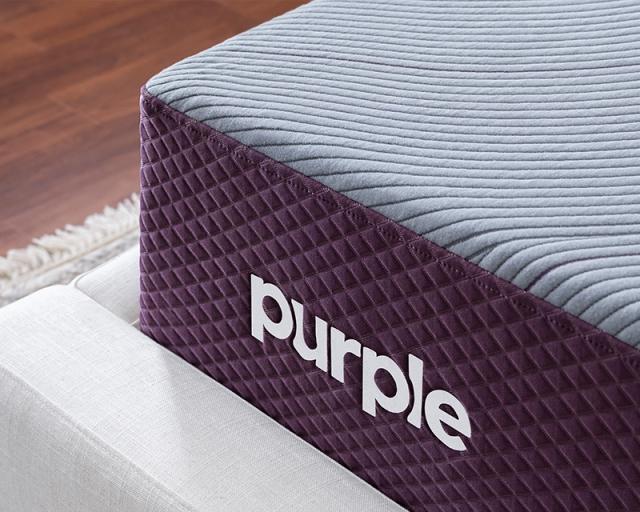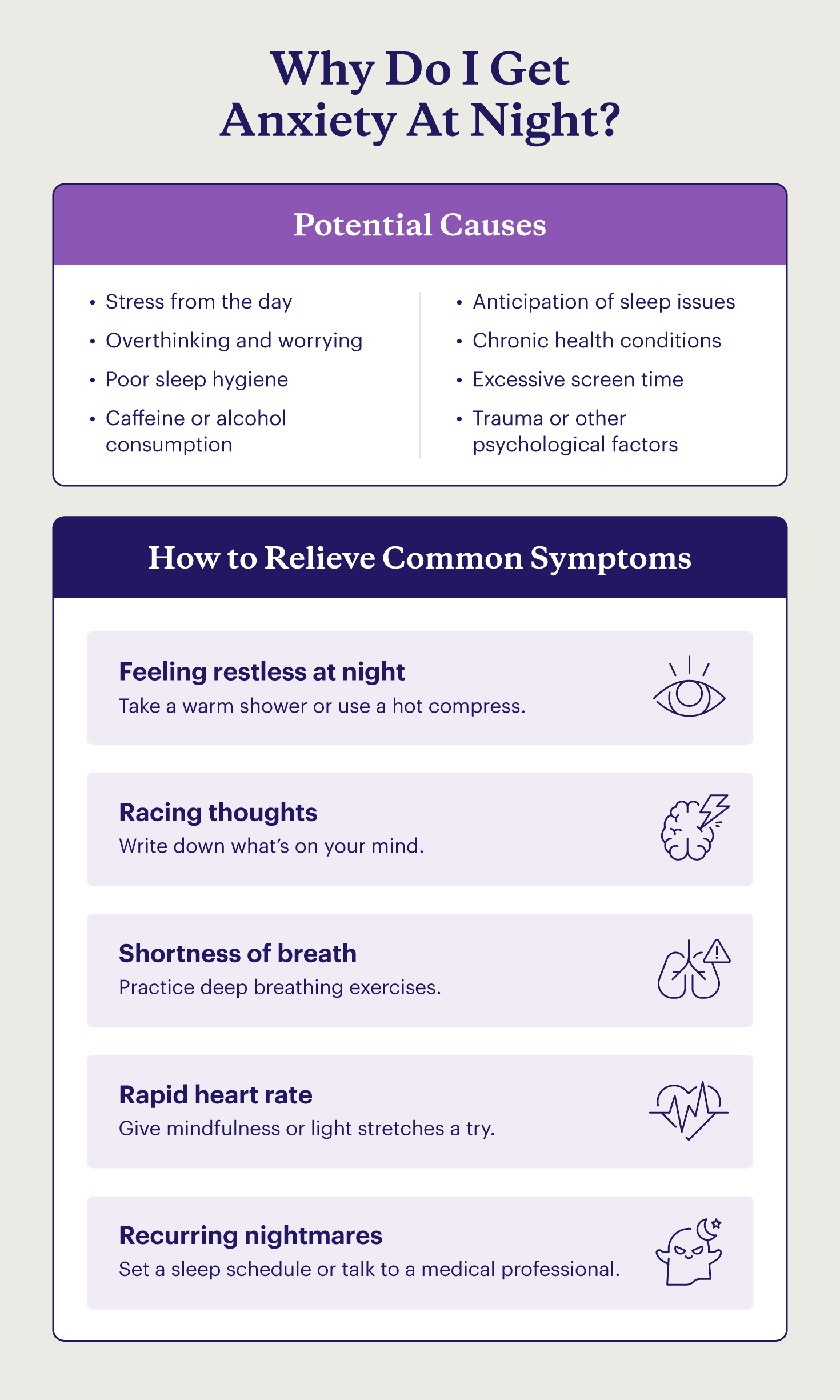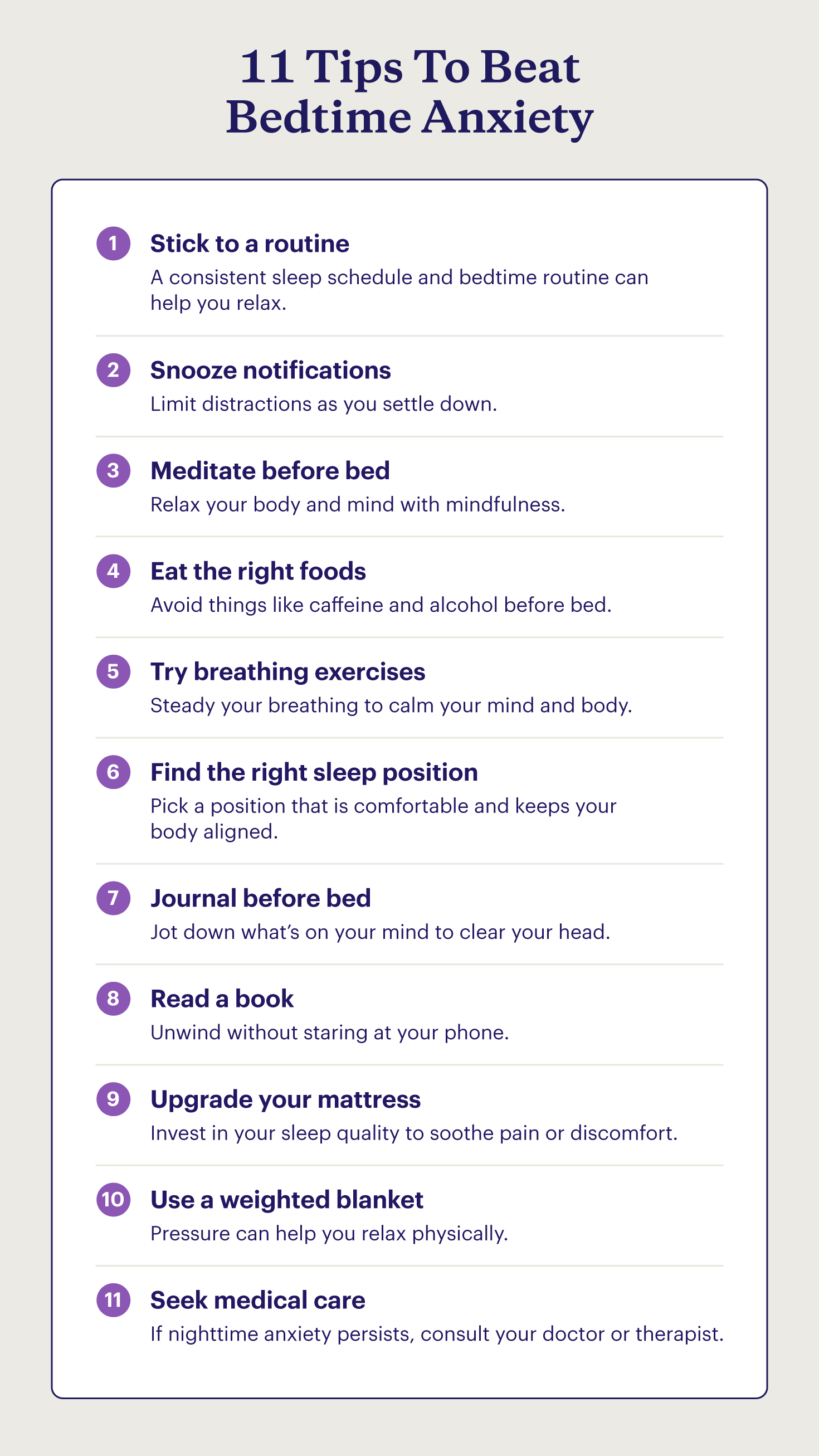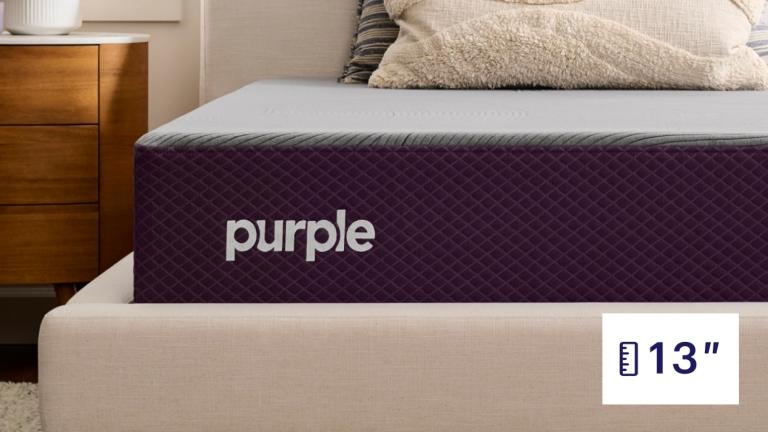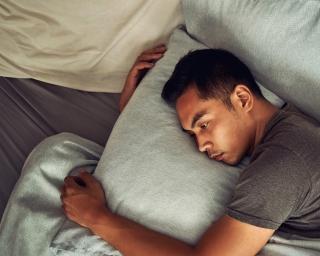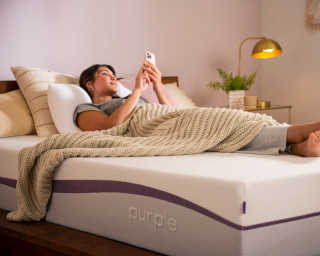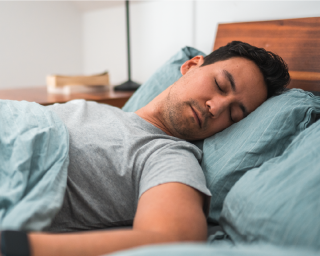How To Calm Anxiety at Night: 11 Tips To Prevent Anxious Sleeping
Key Takeaways
- Anxiety and sleep have a bidirectional relationship: Poor sleep can worsen anxiety, and anxiety can disrupt sleep, creating a challenging cycle.
- Implementing healthy sleep habits, such as a consistent nighttime routine, relaxation techniques, and optimizing your sleep environment, can significantly reduce nighttime anxiety and improve sleep quality.
- Addressing underlying stressors through techniques like journaling or therapy can help reduce overall anxiety levels and improve sleep.
- Even small changes to your pre-bed routine, like snoozing notifications or reading a book, can make a big difference in calming your mind before sleep.
According to the American Psychological Association (APA), anxiety is an emotion where someone experiences worry, tension, and sometimes physical symptoms, such as high blood pressure or lack of sleep.
Sleep and anxiety are intricately linked. On one hand, a good night’s sleep is crucial for managing anxiety. But on the other hand, anxiety can wreak havoc on your sleep quality, creating a vicious cycle.
Learning how to calm anxiety at night, along with practical tips on what to do when you can’t sleep, can help you sleep better. Paired with a comfortable sleep environment and supportive mattress, reducing your stress can enhance your sleep quality and improve overall well-being.
What Causes Anxiety Before Bed?
Anxiety before bed can manifest in several ways:
- Lingering stress from the day: Unresolved work issues, relationship problems, financial worries, or even just a busy day can carry over into the evening, making it difficult to switch off.
- Overthinking and racing thoughts: The quiet of the night can provide a fertile ground for overthinking. Worries about the past, present, or future can spiral out of control, making it hard to relax. This is often related to sleep anxiety, a condition where the anxiety specifically revolves around the act of sleeping itself.
- Poor sleep hygiene: Inconsistent sleep schedules, using electronic devices before bed, consuming caffeine or alcohol in the evening, and an uncomfortable sleep environment can all contribute to anxiety before bed.
- Anticipation of sleep issues: For some, the fear of not being able to fall asleep becomes a self-fulfilling prophecy. This anxiety about sleep itself can create a cycle of sleeplessness.
Because insomnia and anxiety are so closely linked,1 it’s essential to try and identify which came first. For example, does sleep deprivation cause your anxiety, or is it the other way around?
Mental health professional Brooke Sprowl explains the following facts about sleep and anxiety best: “Sometimes, insomnia is secondary, in that it is caused by another primary disorder such as depression, anxiety, or a medical condition. In this case, usually treating the primary disorder [improves] insomnia.”
Symptoms of Anxiety at Night
Nighttime anxiety can manifest in different ways, making it challenging to get a good night's rest. While the experience of anxiety is personal, there are some common signs many people experience before or during sleep:
- Trouble falling asleep: This is one of the hallmark signs of nighttime anxiety. You may lie in bed for what feels like hours, unable to quiet your mind or relax your body enough to drift off. This can lead to further frustration and anxiety about not getting enough rest, worsening the problem.
- Recurring nightmares: Vivid and disturbing recurring dreams can be a sign of underlying anxiety. In fact, 32% of adults dream that they are being chased or in situations beyond their control, according to Purple’s survey. These nightmares can leave you feeling shaken and anxious, making it even harder to return to sleep. They can also cause dread about falling asleep in the first place.
- Feeling restless: An inability to stay still or comfortable in bed is a common symptom. You might find yourself tossing and turning, constantly adjusting your position, or feeling an urge to get out of bed despite being tired. This physical restlessness mirrors the mental restlessness of anxiety.
- Racing thoughts: This involves a constant stream of worries, thoughts, or mental images that you can't seem to control. These thoughts can be about anything from daily stressors to more significant life concerns, preventing your mind from settling down enough to sleep.
- Shortness of breath: A feeling of tightness in the chest or difficulty taking full breaths can be a physical manifestation of anxiety.2 This symptom can be particularly distressing at night, as it can create a sense of panic and further disrupt sleep.
The Impact of Sleep Anxiety
The effects of sleep anxiety can manifest in various ways, impacting both your mind and body. The lack of restorative sleep can lead to a range of issues, including:
- Impaired cognitive function: Difficulty concentrating, remembering things, and making decisions are common consequences of poor sleep. This can affect performance at work, school, and in everyday tasks.3
- Mood disturbances: Sleep deprivation can exacerbate existing mental health conditions like anxiety and depression.4 It can also lead to increased irritability, mood swings, and a general feeling of overwhelm.5
- Weakened immune system: Lack of sleep can weaken the immune system, making you more susceptible to illness.6
- Increased risk of physical health problems: Chronic sleep problems have been linked to an increased risk of developing serious health conditions, such as heart disease, high blood pressure, and diabetes.7
- Daytime fatigue and low energy: Perhaps the most obvious consequence, feeling constantly tired can make it difficult to engage in daily activities, exercise, or maintain a healthy social life.8
11 Ways To Calm Anxiety at Night
If you’re too stressed to sleep, there are many practical steps you can take to manage symptoms and promote relaxation before bed. Below are 11 actionable tips on how to help anxiety at night so you can reclaim your nights and improve your sleep.
1. Stick to a Routine
A regular nighttime routine for anxiety signals your body and mind that it's time to wind down and prepare for sleep. Sleeping only in your bed and maintaining a consistent wake-up time are both effective sleep rituals. These send strong signals to your brain when it’s time to sleep and wake. Going to bed and waking up at the same time every day, even on weekends, helps reinforce this cycle.
Sleep schedule consistency also helps lower anxiety levels. Anxiety is typically driven by the fear of the unknown. Adhering to a strict nighttime routine for anxiety reinforces a strong sense of control and predictability in your life. Creating a predictable and calming bedtime routine is a cornerstone of effective sleep hygiene and can significantly reduce nighttime anxiety.9
2. Snooze Notifications
Certain types of light may disrupt your sleep before you lie down. For example, laptops, tablets, and cell phone screens emit a blue light that tricks your brain into thinking the sun is still up. They also inhibit the release of melatonin.10 Avoid staring at screens an hour or two before bedtime. If digital device abstinence isn’t an option, set your displays to “night mode.” This automatically changes screen colors from blue to amber at sunset so you can avoid blue light at night.
You can also try wearing blue light-blocking glasses during the day or anytime you interact with screens. These are available without a prescription, but if you wear prescription glasses, ask about having your next pair specially coated with this technology.
3. Meditate Before Bed
Meditation is a treatment for insomnia that helps lower anxiety.11 By focusing on the present moment, meditation helps you detach from racing thoughts and worries that often keep you awake at night. Since the past and future are the subjects of most concerns, mindfulness helps eliminate those anxiety-producing thoughts.
Guided meditation soundtracks can be particularly helpful if you’re new to meditation or find it difficult to quiet your mind on your own. These soundtracks often feature calming voices that guide you through relaxation techniques, such as deep breathing exercises, body scans, and visualizations. By following these guided meditations, you can effectively train your mind to focus on the present moment and let go of anxious thoughts.
4. Eat Certain Foods
While it's generally recommended to avoid heavy meals close to bedtime, incorporating certain foods into your evening routine can actually promote relaxation and improve sleep. These foods contain nutrients that support better sleep regulation and can help you wind down before bed.
Foods containing tryptophan, an amino acid that the body converts into melatonin and serotonin (neurotransmitters that promote relaxation and sleep), can be particularly beneficial.12 Some examples include:
- Dairy products: Warm milk has long been a traditional remedy for sleeplessness, and it contains tryptophan.
- Nuts and seeds: Almonds, walnuts, and pumpkin seeds are good sources of tryptophan as well as magnesium, another mineral that can promote relaxation.13
- Chamomile tea: This herbal tea is well-known for its calming properties and contains apigenin, an antioxidant that may help reduce anxiety and promote sleep.14
- Tart cherry juice: Some studies suggest that tart cherry juice can increase melatonin levels and improve sleep quality.15
5. Try Breathing Exercises
Breathing exercises are a powerful tool for calming the nervous system and slowing down your heart rate16, helping you transition from a state of anxiety to a state of relaxation. These techniques can be done anywhere and at any time, making them a convenient way to manage nighttime anxiety.
One popular technique is the 4-7-8 breathing method. This involves:
- Exhaling completely through your mouth.
- Inhaling quietly through your nose for a count of 4.
- Holding your breath for a count of 7.
- Exhaling slowly through your mouth for a count of 8.
Repeating this cycle several times can help slow your heart rate, reduce feelings of anxiety, and prepare your body for sleep.
6. Find the Right Sleep Position
Finding the best sleeping position for anxiety can help reduce physical discomfort and promote relaxation, making it easier to fall asleep fast. While there's no single "best" position for everyone, some general guidelines can help you find what works best for you, or for you and your partner if you’re in need of couples' sleeping positions.
For many, sleeping on your side, particularly the left side, can help reduce heartburn and improve digestion. This position can also help alleviate pressure on the back and joints. Sleeping on your back can also be a good option, as it promotes proper spinal alignment and can help reduce neck and back pain. If you share a bed with a partner and are a light sleeper, find a supportive mattress that isolates motion to avoid being disturbed by your partner's movements throughout the night. Purple’s GelFlex® Grid technology, for example, absorbs pressure and isolates motion so you won’t feel your partner moving around next to you at night.
7. Write Down Your Thoughts
The biggest obstacle to falling asleep is often a mind cluttered with racing thoughts and worries. Writing down your thoughts before bed can be a helpful way to externalize these anxieties and clear your mental space. This allows you to process your thoughts in a structured way, rather than letting them swirl around in your head and keep you awake.
Try keeping a journal or notepad by your bedside. Before turning off the lights, take a few minutes to write down any worries, to-do lists, or thoughts that are bothering you. This doesn't have to be formal or lengthy; simply jotting down key points or a brief summary of your concerns can be enough to release them from your mind. This can help you approach sleep with a clearer and more relaxed mind.
8. Read a Book
If you find yourself lying awake at night, picking up a book can be a surprisingly effective way to induce sleep. Reading provides a gentle distraction from anxious thoughts and worries, allowing your mind to focus on something else. This mental shift can be enough to break the cycle of rumination and pave the way for sleep.
Choosing the right book is key. Opt for something light and engaging, but not so stimulating that it keeps you wired. Avoid suspenseful thrillers or intense non-fiction that might further excite your mind. Instead, consider reading fiction, lighthearted memoirs, or even something you've read before. The familiarity can be comforting and help you relax, allowing you to get more deep sleep.
9. Upgrade Your Mattress
If you can’t get comfortable in bed, you may have an unsupportive mattress. Pressure points build on your sides, back, and neck when you lie on an unsupportive mattress or overly stuffed pillow, leading to tossing and turning all night. Investing in a quality mattress with proper support helps maintain proper spinal alignment, preventing aches and pains that can keep you awake.
Relieve pressure points by picking a pillow and a mattress that conforms to your body. There are many types of mattresses, but most modern memory foam, latex, and hyper-elastic polymer mattresses are designed to contour to your body while also supporting it. A mattress that regulates temperature and keeps you cool throughout the night can also help combat night sweats or overheating due to anxiety.
10. Improve Your Bedding
Choosing the right bedding elements can contribute to a more calming and restful night's sleep. Weighted blankets have gained popularity in recent years for their potential to reduce anxiety and improve sleep. These blankets, filled with small weights, provide deep touch pressure stimulation, which mimics the feeling of being hugged or held. This gentle pressure can have a calming effect on the nervous system, promoting relaxation and reducing feelings of stress and anxiety.17
When determining how heavy your weighted blanket should be, it's generally recommended to choose a blanket that is about 10% of your body weight. For example, a 150-pound person would likely benefit from a 15-pound blanket.
Another option to consider is a grounding sheet. These sheets are designed to connect you to the Earth's natural electrical charge, which some have found to help improve sleep and reduce inflammation.18 While more research is needed to fully understand the effects of grounding sheets, some people find them helpful for calming anxiety at night.
11. Seek Additional Support
If you've consistently implemented these tips and continue to struggle with significant sleep disturbances or persistent anxiety that interferes with your daily life, it's important to seek additional support. Ignoring chronic sleep problems can lead to more serious mental and physical health issues down the line.
Therapists and mental health professionals can provide evidence-based treatments, such as cognitive behavioral therapy for insomnia (CBT-I) or other forms of therapy tailored to address anxiety disorders. CBT-I, in particular, focuses on identifying and changing negative thought patterns and behaviors that contribute to sleep problems.19 These professionals can also help you explore underlying causes of your anxiety and develop personalized coping strategies.
Sleep Better With Purple
It's difficult to focus on relaxation techniques or other strategies for how to calm anxiety at night if you're constantly tossing and turning on an uncomfortable surface. That’s where the proper bedding and mattresses come into play. Check out our selection of top-of-the-line mattresses with our innovative GelFlex® Grid technology and get the sleep your body (and mind) deserves.
Nighttime Anxiety FAQ
Nighttime can amplify worries as the day’s stressors and unresolved stressors come to the surface. The quiet can also create space for overthinking. This can also be caused by poor sleep hygiene, such as inconsistent sleep schedules or using electronics before bed.
The 3-3-3 rule is a grounding technique for managing immediate anxiety: Name three things you see, three things you hear, and move three parts of your body. This helps shift focus from internal worries to the present moment, providing a sense of control and reducing feelings of overwhelm. It's best used in the moment when you feel anxiety rising.
Establishing a consistent bedtime routine, practicing relaxation techniques like deep breathing or meditation, avoiding caffeine and alcohol before bed, and optimizing your sleep environment are all helpful for nighttime anxiety. Addressing underlying stressors through journaling or therapy can also contribute to long-term anxiety management and better sleep.
While lying down can be part of a relaxing bedtime routine, it doesn't directly cure anxiety. For some, lying down can actually exacerbate anxiety by providing more time for racing thoughts. Combining lying down with relaxation techniques like deep breathing or progressive muscle relaxation can be more effective.
More To Explore
Level up your sleep routine with our most-loved products.

